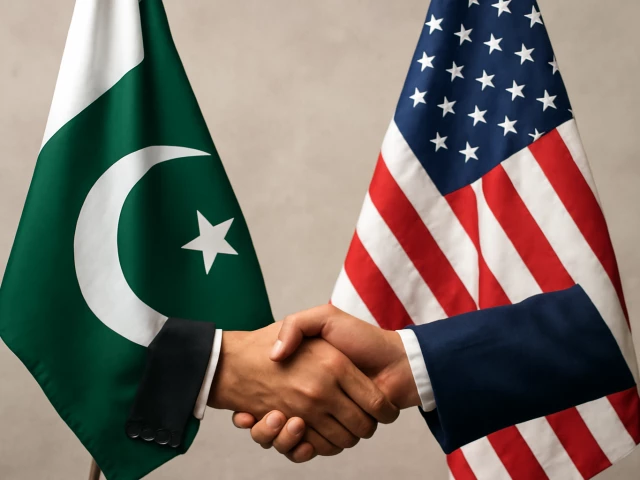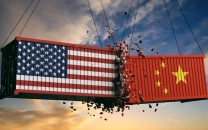Pakistan proposes zero-tariff bilateral trade agreement to US
The development comes after President Trump expressed interest in enhancing trade with Islamabad.

Pakistan has proposed a zero-tariff bilateral trade agreement with the United States aimed at expanding trade relations in multiple sectors, The Express Tribune has learnt on the authority of credible sources.
The development came after the US president expressed interest in enhancing trade with Pakistan, the sources said, adding that the Pakistani government has proposed a bilateral agreement based on mutual interests, offering zero tariffs on selected tariff lines. They added that Pakistan wants to expand bilateral trade with the United States in multiple sectors.
Islamabad’s offer came after the US president brokered a ceasefire agreement between Pakistan and India following tit-for-tat military strikes between the two nuclear-armed neighbours.
President Trump claimed credit for preventing an apocalyptic war between the two arch-rivals which “could have killed millions of people.”
“My administration successfully brokered a historic ceasefire to stop the escalating violence between India and Pakistan,” he said while speaking at the Saudi-US Investment Forum 2025 earlier this week.
“I used trade to a large extent to do it. I said, fellas, come on, let’s make a deal. Let’s do some trading. Let’s not trade nuclear missiles. Let’s trade the things that you make so beautifully. And they both have very powerful leaders, very strong leaders, good leaders, smart leaders. And it all stopped. Hopefully it’ll remain that way, but it all stopped,” he added.
Full comments by US President Donald Trump on India Pakistan understanding of 10 May
— Sidhant Sibal (@sidhant) May 13, 2025
"Let us not trade nuclear missiles, let us trade" goods
"India, Pakistan are getting along, & they can have a nice dinner 🍽️"
"Millions of people could have died due to the conflict" pic.twitter.com/9u0Ijx8dJb
President Trump credited his Vice President JD Vance and Secretary of State Marco Rubio for doing “a great job” by de-escalating the situation. “I think they (Pakistan and India) are actually getting along. Maybe we can even get them together a little bit, where they go out and have a nice dinner together,” he added.
The truce ended several days of hostilities between the two countries that marked the most dangerous military escalation in nearly three decades. The conflict began after India carried out missile strikes on civilian infrastructure in Pakistan, following the deadly rampage on April 22 in the Pahalgam area of Indian Illegally Occupied Jammu and Kashmir, in which 26 tourists were killed. Pakistan denied any involvement in the incident and offered an “impartial investigation.”
Pakistan Air Force shot down six Indian fighter jets, including the coveted Rafale warplanes, during the Indian military’s missile strikes codenamed Operation Sandoor. And days later, Pakistan launched a retaliatory military operation named Operation Bunyan-un-Marsoos, targeting Indian military sites in multiple cities.
I am very proud of the strong and unwaveringly powerful leadership of India and Pakistan for having the strength, wisdom, and fortitude to fully know and understand that it was time to stop the current aggression that could have lead to to the death and destruction of so many,…
— Commentary Donald J. Trump Posts From Truth Social (@TrumpDailyPosts) May 11, 2025
Following the ceasefire, President Trump praised the leadership of both countries and expressed interest in expanding trade with both nations.
I am extremely grateful to President Trump for his pathbreaking leadership and commitment to global peace and for his most valuable offer to play a greater role in bringing lasting peace to South Asia.
— Shehbaz Sharif (@CMShehbaz) May 11, 2025
For decades, Pakistan and the U.S. have been partners who worked together…
The recent ceasefire concluded several days of cross-border hostilities that marked the most severe military escalation between Pakistan and India in nearly three decades. The conflict began after India carried out airstrikes in Pakistan, following an April 22 attack in IIOJK that killed 26 tourists.
Pakistan denied any involvement in the Kashmir incident and condemned India’s strikes, which Islamabad claimed targeted civilian areas. In response, Pakistan launched a retaliatory military operation named Operation Bunyan-un-Marsoos, targeting Indian military sites across several regions.























COMMENTS (2)
Comments are moderated and generally will be posted if they are on-topic and not abusive.
For more information, please see our Comments FAQ